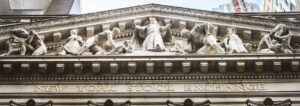Even with a strong rally in the 4th quarter, many investors are happy to see the year behind them and hope for better ones ahead. The year 2001, has ended with a strong stock market rally in the fourth quarter.
The following table summarizes the performance of the main indices for the last quarter and the whole year.
| Index | In Local Currency | In Canadian Dollars | ||
|---|---|---|---|---|
| 4th Quarter | Year | 4th Quarter | Year | |
| TSE 300 | +12.43% | -13.94% | +12.43% | -13.94% |
| S&P 500 (U.S.) | +10.29% | -13.04% | +11.26% | -7.60% |
| Nasdaq (U.S.) | +30.13% | -21.05% | +31.27% | -16.11% |
| Europe (Euro) | +12.80% | -15.08% | +11.05% | -14.85% |
| Nikkei (Japan) | +7.86% | -23.52% | -1.20% | -29.38% |
Although world economies will stay weak in the coming quarter, there are already signs of a bottoming out and even a recovery: rising metals prices, strength in the Baltic freight index, better trade statistics from many ports in the US and consumer confidence. After 11 rate cuts, we believe the Federal Reserve Board will take a breather, stay neutral and watch for signs of recovery. It also means interest rates have probably seen their low for the time being. We believe that the most probable outcome is a modest recovery in the second half of this year. However, there is one risk remaining that we cannot really quantify: deflation, i.e. goods will be cheaper in the future. History has shown that after it sets in, deflation is difficult to get rid of, as there are not many effective economic tools available. Two main examples of deflation are the 1930’s worldwide and the 1990’s in Japan. Note that Japan is still not yet out of the woods …
As for the Canadian Dollar, it continued its decline from US$ 0.6332 to US$ 0.6277 and ended the year with a 5.85% loss. Since then, it has reached a new record low at US$ 0.6197. We have listened to the rhetoric from our government regarding the soundness of our economy during a recent “Canada Team “ visit in the US. As most of you already know, you can’t talk the Canadian Dollar up. Canada needs a major tax reform to attract foreign investment. As the US becomes more and more investor friendly, the gap between the two dollars will remain wide. For now, we just can’t see any catalyst that will change the current trend. The fate of the Euro is very similar. Basically, as we have been saying all along, broad scale socialism is detrimental to the value of the currency.
Oil prices have been weak during the fourth quarter. Although it is difficult to determine whether any OPEC member has cheated and produced above its quota, the main culprits are weak international economies and Russia who has become an influential player in the oil field. The latter basically refuses to abide by OPEC rules and keeps its production up (note that it needs US dollars to finance its economic reform). We believe that at these levels, oil is a profitable business for everybody. Unless the economic recovery is unexpectedly strong, oil prices will most probably remain around US$ 20.00.
In keeping with the Claret tradition, we will use the last quarter of the year to highlight some of our readings that we believe reflect our thinking and our investment philosophy going forward. Instead of paraphrasing the authors and taking the risk of plagiarism (and doing a bad job at it), we will quote them as they are:
Regarding the stock market:
“ We had three huge, secular bull markets that covered about 44 years, during which the Dow gained more than 11000 points. And we had three periods of stagnation, covering some 56 years. During those 56 years the country made major economic progress and yet the Dow actually lost 292 points.
How could this have happened? In a flourishing country in which people are focused on making money, how could you have had three extended and anguishing periods of stagnation that in aggregate – leaving aside dividends – would have lost you money? The answer lies in the mistake that investors repeatedly make – that psychological force I mentioned above: People are habitually guided by the rear-view mirror and, for the most part, by the vistas immediately behind them “. (Warren Buffett)
Regarding diversification:
“…You can tell people have been reading Morningstar or too many magazines when they start using this terminology. I want to be careful how I say this because how you allocate your assets is an important thing. And diversification is a very important thing. But there’s been a whole cottage industry made out of helping people rearrange the chairs – and they’re possibly outsmarting themselves.
Not having all of your eggs in one basket is important when the basket leaks. But it’s not necessarily important to have 100 different stocks. You may own two funds where one is selling the same stock that the other one’s buying that same day.
The idea of large cap/small cap and all these different categories is sort of artificial. It’s a function of the consulting world that wants to help people do things in a complicated way. I think in all of our stock funds, what we try to do is look in theory at any kind of a company – whether it’s large or small, growing fast or slow, etc.
Now we do eliminate the ones we can’t understand and the ones that we think are crummy businesses – and that does narrow the field quite a bit…
So I’d caution you not to get too carried away with the mystery of having one in this category and one in that category. Some call that the Noah’s Ark Principle – you get two to these, two of those and two of the next ones until pretty soon you’ve got a zoo. You want to be careful about inadvertently doing that in your portfolio”. (Wally Weitz)
The Claret Team







